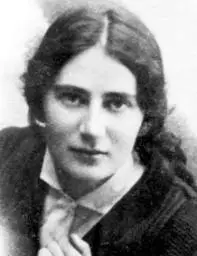Rivka Guber
(1902 - 1981)

Rivka Guber (née Bumaghina) was born in 1902 in Novo-Vitebsk in the Ukraine. She married Mordechai Guber and then immigrated with her family to Palestine in 1925. The couple settled in Rehovot, where Rivka taught Hebrew. They were among the founders of Kefar Bilu (1933), and later left to join another moshav, Kefar Warburg, where they raised their two gifted sons, Ephraim (b. 1927) and Zvi (b. 1931).
Guber was known for her readiness to volunteer her teaching and organizational skills to any cause that would serve the budding Jewish nation. During World War II, as a forty-year-old mother of three (her daughter Haya [b. 1938] was a young girl at the time), Guber volunteered for the ATS (Auxiliary Territorial Service) of the British Army, where she served from 1940–1942 along with other Jewish women soldiers.
Guber imparted to her sons her own values of volunteerism, loyalty and dedication to the Jewish people. Both of her sons enlisted in the Israel Defense Forces during Israel’s War of Independence, and were killed in battle by the six invading Arab armies. In her memoir Im ha-Banim (with my sons), Guber offered a portrait of her sons and shared other aspects of her life and family.
Following Israel’s independence in 1948, a massive wave of immigration doubled the population of Israel in a short time period, from 1948 to 1951). Rivka and Mordecai Guber helped the throngs of new immigrants living in the transit camp at Katina; Rivka organized the education system in the Kastina transit camp (ma'abarah), which later became Kiryat Malakhi. After several years of intensive humanitarian activity helping the Jewish State to absorb its new immigrants, or olim in Hebrew, in the area, they volunteered in 1955 to move to Hevel Lachish, an area of south-central Israel then being developed by a planning group led by Arieh (Lova) Eliav. The Gubers donated their property at Kefar Warburg to the state’s Defense Fund and went to live at Nogah, one of the first moshavim established in the Lachish region, where they again helped Israel absorb and integrate its immigrant population into the fabric of the new nation. Rivka set up and taught classes for the children of the moshav and new immigrnats, while Mordecai guided them through their first steps in their new country.
In her 1961 book El Masu’ot Lachish (Signal Fires of Lachish), Guber described the challenges and difficulties confronting the couple in their work with the immigrants of Lachish and the many achievements of the settlement enterprise there. David Ben-Gurion, then Prime Minister and Minister of Defense, thought highly of Rivka Guber as the role model and a symbol of volunteerism and devotion to the state that she was, and he referred to her as “The Mother of Sons.” Guber was awarded the Israel Prize in 1967 for her life’s work in immigrant absorption.
Rivka Guber was also active in the women’s organizations of the labor movement, served as a member of the Mo’ezet ha-Po’alot or Council of Women Workers - which branched off from the Histadrut - and volunteered for numerous social and humanitarian causes. She was deeply involved in public life in Israel and played a role in the political arena as well.
In her last years she devoted herself to writing and in 1979, when Prime Minister Menahem Begin traveled to Washington, D.C. to sign the peace treaty with Egypt, he included Rivka Guber in the Israeli delegation in appreciation of her work. Rivka Guber continues to be remembered among Israel’s heroes and heroines as an exemplary educator, humanitarian, and Zionist leader in pre-state Palestine and post-independence State of Israel.
Sources: Encyclopaedia Judaica. © 2008 The Gale Group. All Rights Reserved; "Important Women in Israeli History" blogpost; Jewish Women's Archive; University of Michigan


